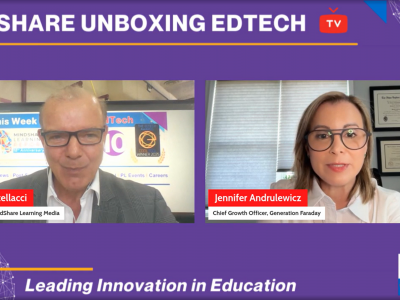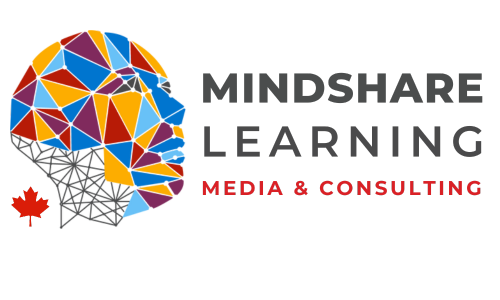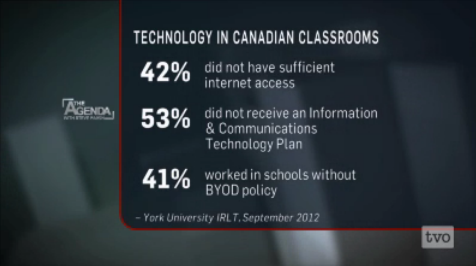Happy New Year! If you thought that 2012 was mind-blowing for change and innovation, buckle up for yet another year of disruptive forces in the EdTech space in Canadian schools!
In post-secondary institutions, students are the change agents who carry 2 to 3 devices, whereas in K-12, innovative teachers and parents are pushing the envelope in providing relevant experiences to students. School Districts are finally going to achieve the classic “tipping point” (Malcolm Gladwell) to embrace 21st century learning to support student success. Yes, we’re well into the 21st century, but apparently, change doesn’t happen overnight in education!
Innovation is no longer an option and 2013 is to be a “watershed” year for EdTech according to Dr. Michael Fullan, recent recipient of the Order of Canada, and author of his new book, Stratosphere.
The overarching theme for 2013 is blended learning, infused with deeper teacher knowledge and practice of pedagogy and technology.
I hope you enjoy our Top 10 predictions below that were hotly debated amongst our team.
1. Mobile device growth will continue to spur on the Wild West in the eTextbook space
The demand for high quality digital content will drive the revolution and raise the game for all Canadian book publishers and new players on the scene. The good news for educators is that there will be plenty of relevant digital resources to augment lessons. Watch for virtual eTextbook stores to crop up which will make the process of purchasing eTextbooks more accessible.
2. A computer for every teacher!
No, Santa hasn’t returned. School board superintendents and IT folks will recognize that they, nor their staff, can do without this piece of technology. Prevailing common sense and declining costs, coupled with BYOD, will provoke yet another “tipping point” where the majority of teachers will finally have a computer and Internet access in the classroom. What year are we in again?
3. Teachers will take greater control of their own Professional Development
Regardless of budget constraints, professional learning communities (PLCs) will continue to emerge. Thanks in part to social media tools like Twitter and Facebook, web-based resources, free webinars and blended-learning, PD for teachers will become more prevalent this year, along with options offered by third party organizations. This will help teachers develop a deeper understanding that technology is a great enabler and not the focal point of instruction.
4. The emergence of flexible learning spaces
Technology is changing how students are learning, but what about where they are learning? Alongside interactive whiteboards, projectors, portable tablets, smartphones and new technologies that are sure to emerge in the next year, we see the need for increased flexibility and greater interoperability in classrooms. Think: the global classroom, and transforming any space into a learning space. This change of landscape will contribute to the increased engagement of students.
5. Affordable, or better yet, FREE courses and content for teachers
The freebie list will continue to grow with a plethora of online courses, textbooks, resources, and apps. But as the saying goes, you get what you pay for. We predict that quality and credibility will continue to be an issue with all of this free stuff, which will lead to teachers tuning into the reality that some content is worth paying for. Digital rights is another dilemma that will arise when content is not designated as creative commons. Perhaps this will be used as a teachable moment to explain what plagiarism is to students.
6. Canadian EdTech Start-ups will continue to balloon
The question is, will the bubble burst? The key is to solve challenges in education with real solutions, not just solutions looking for a problem. Caveat emptor! Kevin O’Leary, Robert’s former boss at The Learning Company, didn’t like the education business because of the unpredictable sales cycles that presents challenges for publicly traded companies.
7. Get your head in the Game!
Canada already shows leadership in the gaming and simulation space with the likes of Spongelab and Toon Boom. 2013 will be the year that gaming moves into the mainstream and more teachers will begin to incorporate gaming strategies into their teaching to enhance student learning in the classroom ecosystem. Let’s not forget that robotics, STEM and ICT which is gaining traction with teachers and students. Check out this First Robotics competition.
8. What the MOOC?
Canada has been a BIG influencer in the massive open online course space with experts such as Dr. George Siemens at Athabasca University. The University of Toronto blazed the trail in Canada this past year when they partnered with the major U.S.-based venture Coursera to offer MOOCs. The revolution will continue, however, we think MOOCs will be used as a way to augment course material, remix existing lessons, and differentiate instruction to students – but not as a replacement for the instructor.
9. Go Social or Go Home
Social media’s and integrated learning platforms in the classroom will enhance instruction with the multitude of options specific to education (Check out: Edsby, Edmodo, and let’s not forget D2L as they’ve transformed their learning platform). Social media provides students and teachers with a meaningful way to solve real-life problems through project-based learning that extends well beyond the school walls.
10. BYOD remains hot, but maybe not!
It’s HUGE in post-secondary, however, Bring Your Own Device will not gain the same traction in Canadian K-12 schools as districts will realize that infrastructures cannot meet the demands due to limited resources to upgrade district technology infrastructure. Some districts have chosen to not go down the BYOD path due to the complexities of multiple platforms and the lack of control. The jury is still out. We think it’s more of a fad than a trend in 2013!
We welcome your thoughts and your predictions: what do you think will happen with educational technology in 2013? Leave your comment below!








